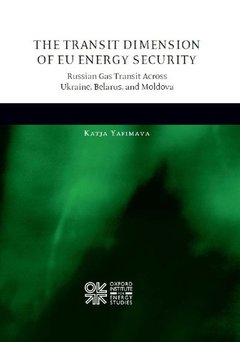The transit dimension of eu energy security: russian gas transit across ukraine, belarus, and moldova Russian Gas Transit Across Ukraine, Belarus, and Moldova
Langue : Anglais
Auteur : Yafimava Katja

This book analyses how EU transit (and hence energy) security is affected by the governance structures of the Eurasian gas network and by asymmetrical power relations between its actors, in particular between Russia and western CIS states (Ukraine, Belarus and Moldova) and their national gas companies. It views the Eurasian gas network as the overlap and interaction of four spaces: the regulatory space, the contractual space, the space of flows, and the space of places, and asserts that the discontinuities between and within the spaces adversely affect EU gas transit security. The volume suggests ways in which these discontinuities can be reduced, and how their negative effect can be minimised. The book identifies the threats to security of Russian gas transit across the western CIS, explains why and how unresolved Russia-western CIS bilateral issues led to the appearance of these threats, and determines whether the existing bilateral frameworks (supply and transit contracts and intergovernmental agreements) are adequate and sufficient to ensure security of transit across the western CIS. Furthermore it identifies EU energy policy gaps and explains why these gaps reduced the Union's ability to deal with such threats. It shows how transit security threats can be reduced through the joint employment of both bilateral and multilateral frameworks.
Introduction. 1. Defining Major Working Concepts of the Thesis: Energy Security, Gas Security, Transit, Gas Transit Security. 2. Theorising Transit Security: the Eurasian Gas Network, Power Relations and Network Governance. 3. Existing Multilateral and Bilateral Frameworks: the Lack of Overlapping Membership and its Implications for EU Gas Transit Security. 4. Gas Supply to Europe: the Role of Non-EU/Non-EEA Suppliers and the Increasing Importance of Transit. 5. EU Energy Policy-in-the-Making: Focus on External Transit Security. 6. Russian-Ukrainian Gas Relations and Their Role for EU Gas Security: Looking for a Politically Acceptable Commercial Framework. 7. The Russian-Belarusian Gas Relations: Balancing Geopolitics and Geo-economics. 8. The Russian-Moldovan Gas Relations: an Unstable Stability. 9. Building a Multilateral Framework for Secure Gas Transit: the Energy Charter Treaty and the (Draft) Transit Protocol. Conclusion.
Katja Yafimava is Research Fellow at the Oxford Institute for Energy Studies (OIES), in the Natural Gas Research Programme. She holds an MPhil in Russian and East European Studies, and is now completing her DPhil at the University of Oxford, Corpus Christi College on a Clarendon scholarship & Overseas Research Students / Universities UK award. Prior to joining the Natural Gas Research Programme in 2006, she conducted research at the Energy Charter Secretariat, Brussels, completed an internship at Shell Global Scenarios team, London, and was an FCO/OSI visiting scholar in Economics at the University of Oxford.
Date de parution : 11-2011
Ouvrage de 316 p.
16.4x23.5 cm
Disponible chez l'éditeur (délai d'approvisionnement : 14 jours).
Prix indicatif 86,57 €
Ajouter au panierThème de The transit dimension of eu energy security: russian gas... :
© 2024 LAVOISIER S.A.S.
